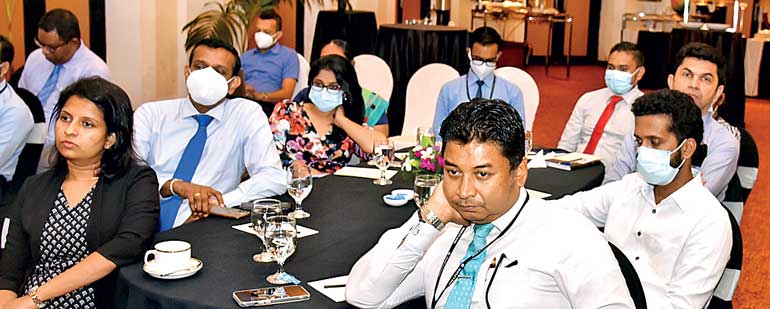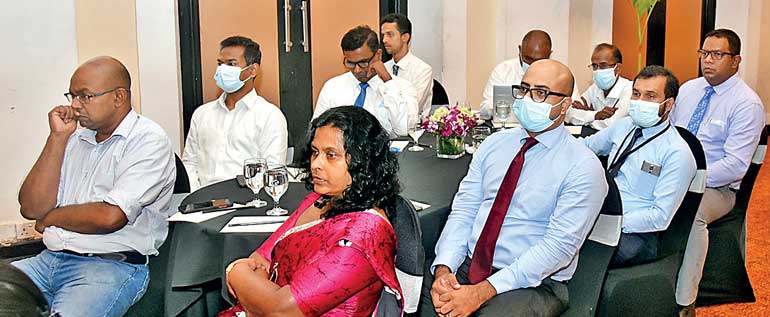Saturday Feb 14, 2026
Saturday Feb 14, 2026
Tuesday, 21 June 2022 00:56 - - {{hitsCtrl.values.hits}}

From left: Ceylon Chamber of Commerce Vice Chairman and Senior Partner and Head of Tax at Ernst and Young Duminda Hulangamuwa, Central Bank Deputy Governor Yuvette Fernando, Moderator KPMG Sri Lanka and Maldives Retd. Managing Partner Reyaz Mihular, Royal Ceramics Lanka Managing Director and Pan Asia Bank Deputy Chairman Aravinda Perera and Seylan Bank Director/CEO and Sri Lanka Banks’ Association Chairman Kapila Ariyaratne - Pix by Ruwan Walpola

By Darshana Abayasingha
State sector reforms, a return to an effective but relevant tax regime and expanding support towards SMEs were amongst matters discussed by the Association of Professional Bankers of Sri Lanka recently, during a forum titled ‘Implications of the Current Economic Conditions – Where do we Stand?’.
The sale or restructuring of loss-making State entities was a common highlight by speakers at the forum. Ceylon Chamber of Commerce Vice Chairman Duminda Hulangamuwa pointed out that, whilst it is difficult to achieve consensus to privatise errant state entities such as the Ceylon Electricity Board, protagonists of such protests can no longer ignore the burdens posed by such institutions saddled with debt.
He noted that key institutions could divest up to 20% of state ownership to infuse much needed transparency and efficiency, and during discussions with the Ceylon Chamber; political parties like the JVP had agreed in principle this must be done to overcome the present impasse.
The forum moderated by the former KPMG Sri Lanka Managing Partner Riyaz Mihular featured the Central Bank’s Deputy Governor Yvette Fernando, Pan Asia Bank Deputy Chairman Aravinda Perera, Seylan Bank CEO Kapila Ariyaratne and Ernst & Young Head of Tax Duminda Hulangamuwa, who is also a Senior Partner.

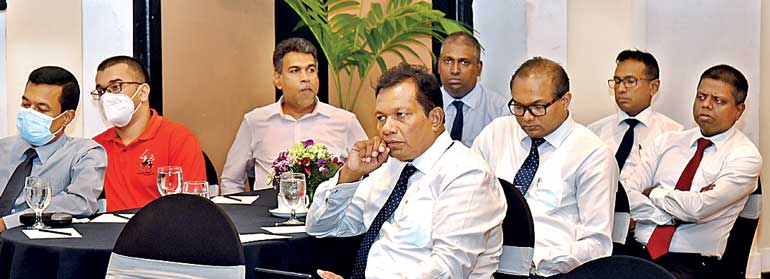
Messenger shot, horse bolted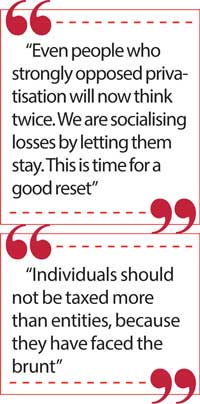
Setting the tone, Mihular touched on the policy decisions that led to the present predicament where the Government and its officials chose to “Shoot the messenger instead of addressing the issue”. Alluding to the challenges faced with foreign exchange and the emergence of a grey market due to flawed policy, Mihular noted that some of the steps taken by the new Central Bank Governor have somewhat controlled the situation. He remarked that the grey market rate for dollars was no more or less similar to the bank rate, which signals things are more or less where they should be now.
“We cannot however just keep getting lines of credit, we need means to pay them back and generate adequate revenue. Certain State-owned entities need restructuring, and this is a good time to seriously look at them and take some decisions. Even people who were strongly opposed to privatisation will now think twice, because they know these institutions are draining revenue and we are all paying for it.
“We are socialising the losses by letting them stay that way. This is time for a good reset. We were living with deficit financing for so many years, and this cannot go on,” Mihular said.
Banking sector must act
Deputy Governor Fernando provided an overview of the fiscal situation and noted that whilst several corrective actions have been taken by the Central Bank in the recent weeks, “some more corrections need to happen”. She added that urgent and unprecedented policy responses through a coordinated approach along with strong communication is essential to address the issues, failing which there could be “catastrophic outcomes” affecting investor confidence and credibility. She said the Central Bank and the Government has been making corrective measures to safeguard vulnerable groups, including measures to ease external pressures on balance of payments and shortage of foreign exchange. The bank is vigorously following rules on export proceeds and action taken already on persons holding on to in excess of $ 15,000 for over 30 days.
Fernando revealed that discussions are underway to consider revising the number down to $ 10,000. Preliminary data shows correction of foreign worker remittances in May and a gradual rebound of the economy is expected through the implementation of long-needed structural reforms, she added.
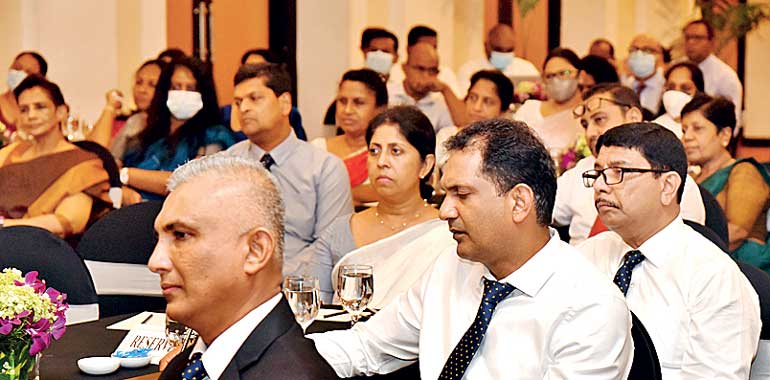
Keep an eye on debt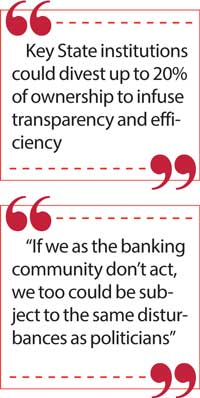
“We need significant bridging finance in the near time to keep fundamental economic activities going. Long-standing structural issues and fiscal indiscipline have gradually amplified this crisis. The Sri Lankan economy is under stress leading to social unrest and political instability leading to catastrophic consequences for current and future generations of the country. Fiscal space remains extremely low. If we as the banking community don’t act, we too could be subject to the same disturbances as politicians, because social unrest is going to a bad level.
“All these are credit lines; we have to pay them back. This adds debt to our future generations. Unless we divert our resources to productive areas where there is generation in the real sector, this could become another crisis. So, we have to pay attention to medium- to long-term action. SMEs are important. They are the engine of growth and contribute immensely to employment and growth,” Fernando averred. The Deputy Governor acknowledged that bank balance sheets are under stress today due to the macro developments and prolonged imbalances. Devaluation of the rupee, acute forex shortage, Government debt standstill, possible depreciation of assets due to unwinding of moratoriums and the energy crisis are some of the developments that have caused threats to bank capital and equity positions. The sector needs to be extremely vigilant in navigating these challenges to ensure its fundamentals stay strong.
Acute liquidity shortage has severely affected the activities of banks, Fernando noted. Several banks are expected to draw down the buffer to withstand the situation, with debt moratoriums ending in June.

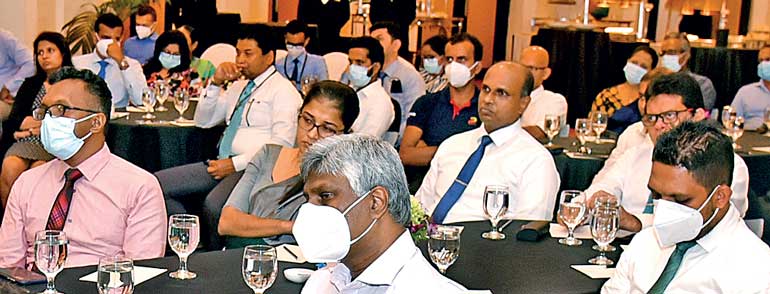
Taxing economics
Lending his perspectives, Hulangamuwa touched on the role played by the Ceylon Chamber and remarked that the apex corporate body had engaged with all political parties to stress upon the need to maintain stability to ensure business and industry could continue, as this was critical to maintain internal and external economic activity. However, challenges in the external environment persist and are serious, he noted.
He pointed to Singapore Airlines cancelling cargo flights to Colombo last week due to issues with refuelling. Though this seems a simple problem, there are implications like the perishable produce that must be shipped to the far east. If SriLankan Airlines has the capacity to service the shortfall is to be seen, he stated.
“Are these credit lines sufficient to have continuous fuel after June and July? We don’t know. We (CCC) met the Premier and told him that we need to know when IMF funding will come, as people will need some hope and there has to be a road map. We need to know how bridging finance is coming and how it’s progressing. Saying there is no fuel, no money is not it. Most industries have to change course. This problem will continue for a while. In the next two or three years, we will have to continue to borrow.
“So, what is $ 51 billion in debt now may go up to $ 70 billion. I don’t see any other forex coming in terms of real FDIs over the next 1.5 years. Sri Lanka must increase exports, and tourism will play a major role. But there must be energy for that. We need investments of about $ 5 billion over the next two years, then we can come back to normal operating systems,” Hulangamuwa said.
The Vice Chairman of the Ceylon Chamber added that State sector reforms are necessary though not easy as they can even bring down governments. He stressed on the need to attract large-scale investors to Sri Lanka affording them necessary land and concessions, whereby others would follow and significant leaders.
Speaking on taxes, Hulangamuwa noted the banking sector is the most heavily taxed sector at almost 65%. He stressed that income taxes should not go beyond the envisaged 30% and above for individuals, as it is employees who contribute the bulk of taxes whilst already hard pressed by the inflationary pressures. “It has to be looked at practically. Corporate rates can go up slightly. WHT is low so it can go to 10%, I feel, but all of that might take about three months of discussion. Inheritance and wealth tax was also looked at, but I don’t think that will happen. Individuals should not be taxed so much more than entities, because they have faced the brunt and it should not exceed more than 6%,” he said.
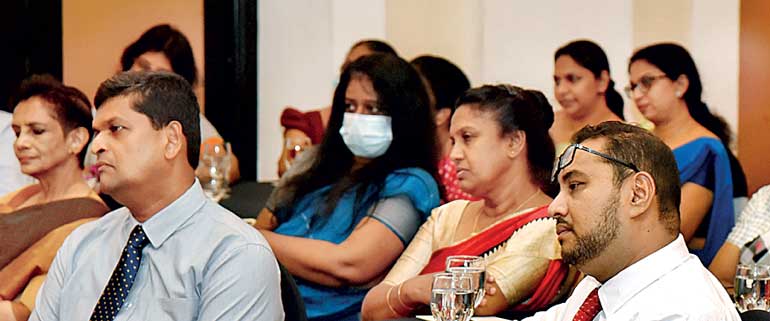
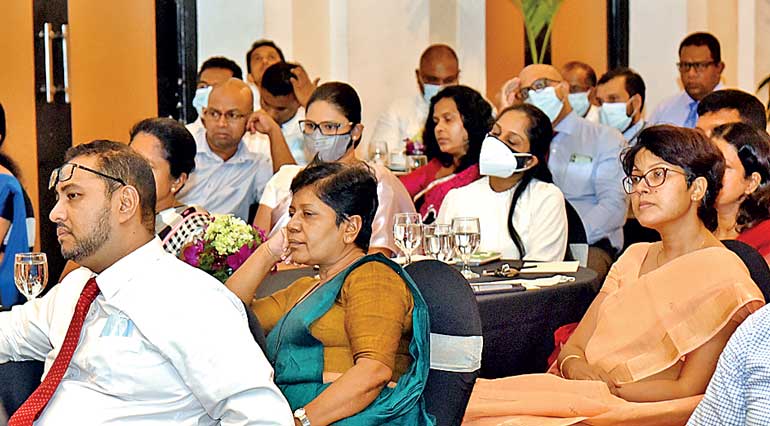
Banking sector concerns
Seylan Bank CEO Kapila Ariyaratne, said the real issues began with the sovereign downgrade, which had taken place rather rapidly, whereby the banking sector had begun to lose access to a number of facilities enjoyed with its partners globally. This was compounded by loss of short-term facilities, loss of remittances, growth of grey market, and steep hike in interest rates that forced some institutions to postpone or cancel plans for tier-2 capital enhancements. With the sovereign default banks had to take additional impairments as credit quality was impaired.
He expressed hope that new taxes will not push tax on banks past the 80% threshold and this would potentially become unbearable under these conditions, he said. This could lead to capital shortfalls and inability to support deserving sectors leading to stunting growth.
With the end to moratoriums coming up, this could affect portfolio quality. The interest rate hike is making payments difficult to many sectors, with only tourism expected to have its moratorium extended. Large scale construction companies too are suffering, he said, with exports the only bright spot and banks need to prioritise this segment, Ariyaratne said.
“We have to ensure mutual survival over the next two years. Changes in regulatory requirements and technology require investment especially in foreign currency. Service levels from partners are also dropping. We have asked to renegotiate terms with some of our international partners, some of them are willing, others not. “HR costs are also a concern, as their cost of living is up. Staff are asking for help at least for travel and these are things we need to look at whilst ensuring operations of the banks remain sustainable. We have to help them at the time of need. Attrition is an issue as many people are moving overseas, but it’s very difficult to dissuade them,” he explained.
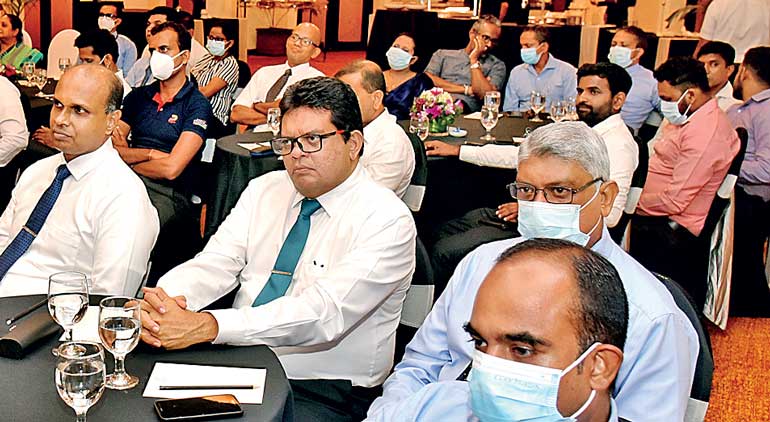

Cautious optimism
Pan Asia Bank Deputy Chairman Aravinda Perera, who is also Royal Ceramics Managing Director, advised banks must be very cautious with security-based lending in the present milieu, and equally cautious of performance-based lending. He explained that though a company’s financial performance may seem sound on paper, these results have been achieved in a very different milieu as the situation on the ground has changed drastically due to the lack of energy and the depreciation of our currency.
Perera, however, enthused that nations such as Thailand and South Korea have faced similar issues before and had successfully engineered a turnaround within a short space of two years through a program of reforms and effective restructuring, and expressed hope that Sri Lanka too could employ a similar trajectory.
“We must stay positive and focused. State sector reforms are very important. There are many good places but there are others that need significant reform. The Government must focus on providing medicines and food safety – and I’m talking about basic food, not green apples.
“Then the provision of fertiliser for agriculture. We must also look at sustainable energy. Subsidies kill economies. Somebody has to pay for them, so who is going to take the bull by the horns and make the change? Someone has to take a stand at some point,” Perera stated.
A shock therapy like this can be a good reset on how the country goes forward. The banking sector is critical for this recovery.
